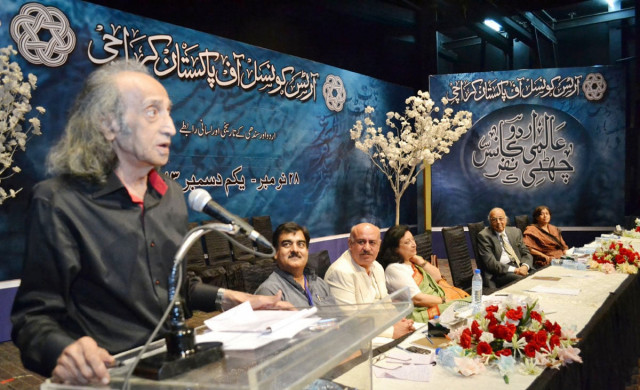Sixth International Urdu conference: Literati stress historical bond between Urdu, Sindhi unbreakable
Those languages which do not make space for others often die, say speakers.

"Languages do not fight each other but we do," said Imdad Hussaini. PHOTO: NNI
Urdu and Sindhi languages are historically interlinked and their linguistic association did not start after the partition of the Subcontinent. This is not the time to denounce any language over political reasons.
This was maintained by speakers on the topic of ‘Historical and linguistic linkages of Urdu and Sindhi’ on the third day of the sixth International Urdu Conference organised by the Karachi Arts Council on Saturday. Those languages which do not make space for others often die and there is rich cultural background behind any language.
They were of the view that Urdu and Sindhi could go on to survive for centuries because they had been able to keep their individual identities intact for years.

“Changes in any languages come through a natural process,” said famous Sindhi poetess Sehar Imdad. She said that Persian was imposed for 900 years but Sindhi language managed to survive, adding that languages are interlinked like the borders of countries. “All languages of this part of the world are historically linked to each other.”
The poetess went on to say that the link between the both languages existed when Urdu was called Rekhta and Hindustani. Reciting a couplet ‘Tere Dar Tak Le Aay, Peron Ka Ehsan Hay Saeen’, she said Urdu poets have used Sindhi words like ‘Saeen’.
Famous writer and poetess Atia Dawood said that people had learned Urdu through music and poetry. “We didn’t know when we learnt Urdu. But the troubling situation with the new generations is that they talk to each other in English,” she said. She was of the view that hatred among people started when the language bill was tabled in 1972.
Dr Saleem Memon, the director of the Shah Latif Chair at the Karachi University, traced out the historical background of both the languages, saying that the cultural link between them started with the advent of Muslims. “Arabic influence is clearly seen over different languages but today we can’t progress without English while Arabic is restricted to madarssas.”
Dr Memon said that famous Sindhi poets, including Sachal Sarmasat and Shaikh Ayaz, also composed poetry in Urdu. “It is a clear sign that Urdu didn’t come in Sindh after partition.”

He said the influence of Urdu increased when 350 Sindhi schools in Karachi were converted into Urdu after the partition.
“The link between the two languages increased after the partition when Urdu-speaking people migrated to Sindh. They lived in rural areas and adopted the culture and language of local people,” said Dr Fehmida Riaz.
Dr Riaz said that Sindhi TV channels were promoting Urdu by inviting Urdu-speakers to their programmes. “Sindhi literature should be translated into Urdu and different stories of Sindhi papers should also be published in Urdu papers,” she suggested.
Dr Qasim Bughio said, “There is not a single country across the world that speaks one language. It is multilingual society. No one can survive with a single language,” adding that the issue of languages should be resolved and the government must form a language commission.
Stressing that every language has its own history and culture, Dr Bughio said, “We have to embrace all languages. All languages of Pakistan should be treated as national languages.”
“I feel guilty because I can’t speak Punjabi,” he said, adding that people eagerly learned French and German but not Pashtun and Balochi. The tension among different ethnicities will be reduced as we learn different provincial languages, he added.
Mazhar Jamil said that both languages remained close to Arabic and Persian historically. He said that Dr Nabi Bux Baloch wrote on 71 Urdu poets who made contributions in last 300 years.
“We lost half of the country over the issue of language,” said Imdad Hussaini. “Languages don’t fight with one another but we do. They learn and teach each other.”
Published in The Express Tribune, December 1st, 2013.



















COMMENTS
Comments are moderated and generally will be posted if they are on-topic and not abusive.
For more information, please see our Comments FAQ